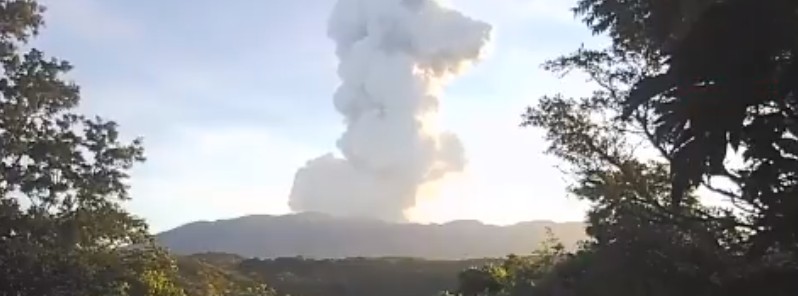Powerful phreatic eruption at Rincon de la Vieja, Costa Rica

A powerful phreatic eruption took place at Rincon de la Vieja volcano, Costa Rica at 11:40 UTC (05:40 LT) on June 28, 2021.
The event lasted about 3 minutes, ejecting dense column of gas and steam, with some amount of ash, up to 4.2 km (14 000 feet) above sea level, drifting N-NW.
#RincóndelaVieja 28 de junio 2021, 05:42 am. Imágenes desde nuestras webcams ubicadas en Gavilán de Upala y Sensoria. #ovsicori pic.twitter.com/C0UV8ePW8D
— OVSICORI-UNA (@OVSICORI_UNA) June 28, 2021
Erupción del 28 de junio 2021 #RincóndelaVieja visto desde Curubandé de Liberia. Gracias a Alejandro Masís. #ovsicori pic.twitter.com/FhNELdqUOY
— OVSICORI-UNA (@OVSICORI_UNA) June 28, 2021
28 de junio 2021. Desde la cima del #VolcánTurrialba se observó la columna que levantó el #VolcánRincóndelaVieja hoy a las 05:42 am. Aproximadamente 192 km en línea recta entre ambos volcanes.#ovsicori pic.twitter.com/Xw7jZFoFLu
— OVSICORI-UNA (@OVSICORI_UNA) June 28, 2021
"It was a pretty energetic eruption," said Maarten de Moor, a specialist at the Volcanological and Seismological Observatory of Costa Rica (OVSICORI-UNA).
Ash was deposited on nearby communities, but the eruption did not cause damage or injuries.
Lahars were observed in the volcano's northern drainages.
28 junio 2021. Lahar en los cauces ubicados al norte del #RincóndelaVieja. Gracias a los vecinos por enviarnos estas imágenes. Kevin Araya, Karol Quesada y Don Gerardo. pic.twitter.com/UO0QJAZgBa
— OVSICORI-UNA (@OVSICORI_UNA) June 28, 2021
The National Commission for Risk Prevention and Emergency Management said it had deployed a team to evaluate the situation, and urged people not to approach the site.
The last eruptive phase of this volcano lasted from January 30 to November 3, 2020 (VEI 2).
Geological summary
Rincón de la Vieja, the largest volcano in NW Costa Rica, is a remote volcanic complex in the Guanacaste Range. The volcano consists of an elongated, arcuate NW-SE-trending ridge that was constructed within the 15-km-wide (9.3 miles) early Pleistocene Guachipelín caldera, whose rim is exposed on the south side.
Sometimes known as the "Colossus of Guanacaste," it has an estimated volume of 130 km3 (31 mi3) and contains at least nine major eruptive centers.
Activity has migrated to the SE, where the youngest-looking craters are located. The twin cone of 1 916 m (6 300 feet) high Santa María volcano, the highest peak of the complex, is located at the eastern end of a smaller, 5 km (3.1 miles) wide caldera and has a 500 m (1 640 feet) wide crater.
A plinian eruption producing the 0.25 km3 (0.05 mi3) Río Blanca tephra about 3 500 years ago was the last major magmatic eruption. All subsequent eruptions, including numerous historical eruptions possibly dating back to the 16th century, have been from the prominent active crater containing a 500 m (1 640 feet) wide acid lake located ENE of Von Seebach crater.
This volcano is located within the Area de Conservación Guanacaste, a UNESCO World Heritage property. (GVP)
Featured image credit: OVSICORI-UNA

Commenting rules and guidelines
We value the thoughts and opinions of our readers and welcome healthy discussions on our website. In order to maintain a respectful and positive community, we ask that all commenters follow these rules.